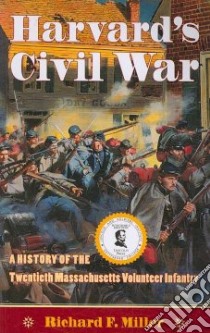Harvard's Civil War - 9781584656753
Un libro in lingua di Miller Richard F. edito da Univ Pr of New England, 2007
- € 20.00
- Il prezzo è variabile in funzione del cambio della valuta d’origine
The Twentieth Massachusetts Volunteer Infantry was one of the most influential northern units in the Army of the Potomac. Its nickname, the Harvard Regiment, was derived from the preponderance of Crimson-connected officers on its roster. The fortunes of war placed this unit at the lethal crossroads of nearly every major battle of the Army of the Potomac from Ball's Bluff (1861) through Grant's Overland Campaign. After going through its baptismal fire at the debacle of Ball's Bluff, the Harvard Regiment was the first to plant its colors on the Confederate works at Yorktown; fought McClellan's rear guard actions during the Seven Days' Campaign; was mauled in Antietam's West Woods, on Fredericksburg's streets, and on Marye's Heights; faced Pickett's charge at Gettysburg; and was at the deadly intersection of the Orange and Plank Roads at the Battle of the Wilderness.
But the regiment's influence far transcended its battle itinerary. Its officers were drawn from elite circles of New England politics, literature, and commerce. This was the regiment of Oliver Wendell Holmes Jr.; of his cousins, William Lowell Putnam and James Jackson Lowell, both nephews of James Russell Lowell; of Paul Joseph Revere and his brother Edward H. R. Revere, both grandsons of Paul Revere; and of Sumner Paine, great-grandson of Declaration of Independence signer Robert Treat Paine.
Because its officers were highly educated, many of the Harvard Regiment left copious collections of diaries, memoirs, and letters, many published. Yet the history of the Twentieth Massachusetts comprises a social document beyond the evocative and tragic recollections of its highly literate leadership. Although the Boston elite dominated the regiment's officer corps, half of its recruits were immigrants, mostly German and Irish. The ethnic tension that dogged the regiment during its existence reflected an uneasy mix. The regiment included Copperhead and abolitionist gentlemen, radical German emigres from the failed Revolution of 1848, the sons of prominent Republicans, and the sons of Lincoln-haters. Miller adroitly weaves a social history of the period into his narrative, offering readers a fascinating backdrop that enriches vivid descriptions of battlefield triumphs and catastrophes.
The influence of the Harvard regiment continued to reverberate long after the war. Commemorated in poems, speeches and histories by such distinguished figures as Herman Melville and John Greenleaf Whittier, and by alumni such as Oliver Wendell Holmes, Jr. and William Francis Bartlett, the experiences of the Twentieth Massachusetts Volunteer Infantry would define how later generations of Americans understood the Civil War.
Informazioni bibliografiche
- Titolo del Libro in lingua: Harvard's Civil War
- Sottotitolo: The History of the Twentieth Massachusetts Volunteer Infantry
- Lingua: English
- Autore: Miller Richard F.
- Editore: Univ Pr of New England
- Collana: Univ Pr of New England (Paperback)
- Data di Pubblicazione: 01 Agosto '07
- Genere: HISTORY
- Pagine: 530
- Dimensioni mm: 222 x 139 x 38
- ISBN-10: 1584656751
- EAN-13: 9781584656753


